On Air Now
The Capital Weekender with MistaJam 7pm - 10pm
17 November 2017, 18:33
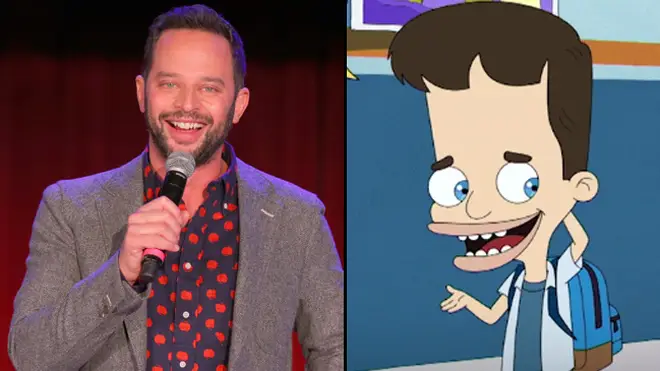
The writer and comedian reveals the process behind the most hilarious and vital show on television and the important conversation it aims to open.
It is rare for any TV show, let alone a cartoon full of comedians, to find itself only a few weeks after its release at the centre of a wider public discourse. Yet Big Mouth, the warts and all analysis of puberty, presents its viewers with challenging, intelligent and hilarious discussions concerning not just the horrors of growing up but the politics of sex and how our attitudes develop over time.
Indeed, 'The Head Push' episode could not have arrived at a more relevant time, focusing entirely on the subject of consent, engaging the audience through realistic scenarios spliced together with Seinfeld parody skits and the ghost of Prince extolling the joys of mutual oral sex. Ridiculous it may be, but the script's skill lies in it's ability to never lose track of, or diminish, the target subject. Many shows will presumably aim to explore these topics in a post-Weinstein Hollywood but credit is surely due here for the bravery of examining them when nobody else was bringing the conversation to the table.
We caught up with co-creator Nick Kroll to talk through the writing process, teenage inspirations and challenges behind the most accidentally yet vitally relevant TV show of 2017.
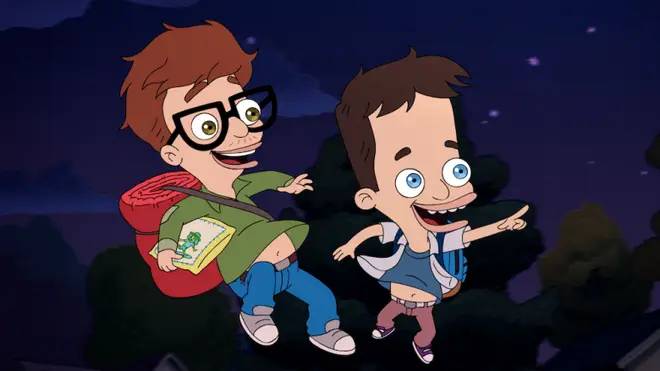
PopBuzz: Obviously Big Mouth is loosely based around you and Andrew (Goldberg, co-creator)'s experiences growing up. What specifically in the show is ripped directly from your real lives?
Nick Kroll: Oh, there's a bunch of stuff. Let's see. Well, Andrew really did cum in his pants slow dancing with a girl at a bar mitzvah. So we changed that from bar mitzvah to school dance. So that happened. I did hit puberty late and was insecure about my little boy penis. We did have a friend who used to have sex with his pillow...
PB: Was soup involved?
NK: No, and there was never an issue of custody over the pillow baby. Oh, and our friend did get her period for the first time on a class trip to the statue of liberty. The only artistic license we took was we put her in white shorts. We thought that was slightly more dramatic.
PB: Was there anything on the other end of the scale where you thought "oh no, this is too embarrassing, we can't put it in"?
NK: You know, not really. I think the motto for the writers room was "nothing is too embarrassing or awkward". That's what makes the show 'the show', trying to properly and realistically depict what it's like to be that age and having the feelings, emotions, desires and questions that kids at that age are feeling.
PB: There's that great line in the first episode where you and Andrew's characters are in the bathroom and saying "isn't everything just so embarrassing?". Is that the motto we should take away from the show?
NK: Yeah I think it's like, look, that's what it feels like when you're that age but the crazy thing is that's what things feel like for your whole life. It's just hopefully you begin to learn how to process and deal with those feelings of embarrassment as life goes on. But the truth is you carry that stuff with you for the rest of your life and it manifests itself in other ways. Sexuality is inherently a weird, embarrassing thing for people. Trying to figure out what they like, what they need, what they don't like and I think that all of those things are a part of it.
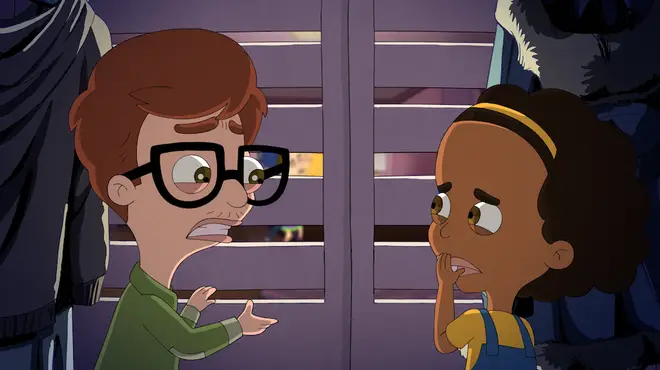
PB: There's moments in the series, particularly 'The Head Pusher' episode on consent, that are better than the sex education seen at a lot of schools. Do you remember what your sex ed was like? Was it just a dodgy VHS explaining the basics or was it more profound than that?
NK: I don't actually remember my sex education stuff that well but I do feel it was like a bad industrial video, VHS. And another thing that was taken from my life was my parents - you know in that first episode when we're in the car and my mother in the show, voiced by Maya Rudolph, is like "Andrew's body is changing, his nipples are engorged, those are secondary sex characteristics"? That's how my mom tried to help me navigate it. She was just trying to give me information to demystify it. But what's interesting is, she was doing her best and I'm grateful for it but you can't process what you tell someone else and how they're going to process it. So, for me, she was trying to help me but what I took from it was I just became more acutely aware of what was happening to other people and wasn't happening to me. So she was trying to just help and I processed it differently.
PB: Well that explains why it all feels so real. In particular with the "first period" story, I would imagine the female writers informed moe of that episode.
NK: Yes, very much. Historically on TV, puberty has really been more about the boy's experience. That's all sort of been dealt with. But the reality is, obviously, women go through puberty too and have their own experiences and it was very important for us to have strong female voices in the writers room helping to navigate that. So, Jennifer Flack, who was one of the co-creators and executive producers of the show, really led the charge on that. And if we had an episode that was about the period stuff we wanted one of our female writers to write that. Or 'Girls Are Horny Too', it's important that a woman wrote that. I can't remember, to be honest, who wrote 'The Head Push' episode, I can't remember, it might have been a woman (ED - it is credited to Bryan Francis) but part of that was a lot of discussions in a room about what it was like for girls to feel the pressure at that age to do stuff. And for boys also to be like...you know, there's a conversation at the end of that episode that leads into the 'Seinfeld' stuff which was about boys trying to figure out too - "what's ok? How are we supposed to get a blowjob?" - and it's like "you have to ask". Then Andrew's like "oh, I'd rather not have that conversation" and Jay is like "but they're never gonna do it". We wanted to have a conversation about it where all points are addressed which isn't just "It's not ok" but also the other side which is like "but this is confusing, we don't know the rules". Obviously, culturally right now, that episode is even more prescient based on what's going on, trying to navigate what's ok, what is consent and what are the rules.
PB: It has become so relevant. And particularly in terms of comedy, we know the stories that have come out in the industry over the last couple of weeks. You, I thought, may have a slightly different perspective coming from the alt comedy scene and (legendary New York improv theater) UCB. Is that still a "boys club"? Because it always appears like more of an open environment than the regular stand up circuit.
NK: Well it's hard to say as a man what feels like a "boys club" and what feels exclusionary or inclusionary. As a white, straight male, my perspective is skewed by the privilege I've had. So I try to avoid making grand statements about like "the UCB scene is more open" or "the stand up scene is more tricky or predatory" because I can't speak to what it's like to be a woman. To me, the good thing that can come out of this crazy time is having more honest and open conversations about it and what's ok, what's not ok. It's not always black and white, and that doesn't mean I'm trying to defend any of the behaviour, it's just that the greyness is what is so difficult about it. The best thing that can come out of it is a conversation about it. That's what I think we were trying to do with the show - create a platform to talk about this stuff. I think the more that you demystify it and have open conversations about it, hopefully the more positive versions of those conversations can take place.
PB: Another conversation that's opened up around comedy is "can you tell jokes about a subject like this?". What I loved about 'The Head Pusher' episode is that it walked the line so well, keeping it funny but never losing the seriousness of the situation. How difficult was it to break that script in the writers room?
NK: Well thank you for that. I think the 'Seinfeld' cutaways helped alleviate some of the stress of talking about that stuff. Being able to cut away to that let everybody breathe and laugh a little bit. But then you'd come back to it and you'd try to explore it. And I think specifically that character Daniel, voiced by Zac Woods, gave a very modern version of it which is seemingly a feminist guy who's taking 'slut-shaming' or 'toxic femininity', using these terms and turning that on its head. Because obviously there are gross men who are super manly dudes who are doing it. But there's also the kind of man who's using the feminist vocabulary to acheive the same end. And they're as dangerous as any classic masculine voice.
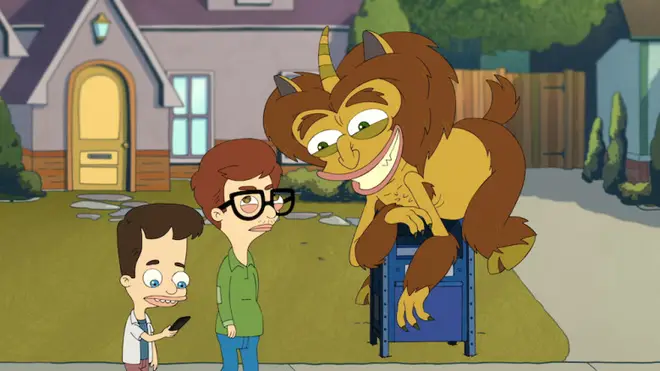
PB: Can you give away any hints about what we can expect from Big Mouth season 2?
NK: We have a lot of stuff that we are planning for season 2 which is a lot more conversations about puberty. But also expanding beyond just The Hormone Monster as there are other parts that are not just the hormones that come into play within burgeoning sexuality. Issues of shame, drugs and a lot of other stuff like that. There's things that we want to explore around shame and divorce and understanding sexuality and all that kind of stuff.
PB: You mentioned The Hormone Monster there so I've gotta ask the question the whole internet is asking - are you doing a Will Arnett voice impression for that character?
NK: No, I'm not doing a Will Arnett voice at all for it. I've seen that and the other person I've seen is Diedric Bader who's another very talented actor. No, the truth is Andrew, Mark (Levin, co-creator) and Jen were talking about how there should be something in Andrew's ear, sort of like a hormone monster and Mark was like "we should just have a Hormone Monster". And they then talked to me about it and then I sort of immedately was like (in the voice) "touch yourself Andrew". It was just like that. It sort of came out. The truth is the voice is closer to a character I did on 'Kroll's Show' named Nash Ricky who was kinda like a Brett Michaels, '80s hair-metal rocker. That was sort of the basis for the voice. I think Will is an unbelievably talented actor and incredible voice actor but no, it was not inspired by him or his voice. It's just there's a certain quality and gravelly nature to that voice that's wonderful so I guess people have made that connection. Plus, obviously Will is the voice of 'Bojack Horseman', another Netflix show, so the last thing I'd wanna do is go "hey, let's do the same voice as that other animated show on Netflix". But I think there is a gravelly quality to it so I understand that people have made that connection.
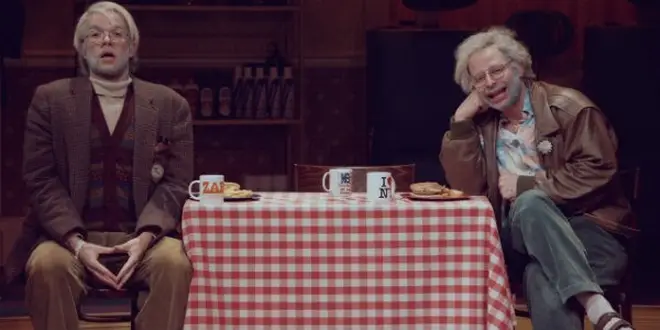
PB: Final question, I have to ask about Oh Hello. You and John (Mulaney) have said you want to keep doing that project for years. Have you figured out what the next step with George and Gil might be yet?
NK: No, we're talking about it. John and I are in conversations with Gil and George. They will write us emails - well, their daughters will write us emails. They'll dictate to their daughters then print it out and mail it to us. Then they make us fax it back. So it's an ongoing conversation. Let's just say that their egos have been inflated by the success of the Broadway show and they've been very difficult to negotiate with. The hope is John and I will come to some sort of agreement with Gil and George but they're asking for Per diem even when we're not in production. But all they want in Per diem is "Camel Cash" so they want, I guess, a puffy vest with the Joe Camel logo. So we're working on that. If we can get them a Joe Camel puffy vest then they said they'd be willing to talk about doing another play. Our goal is to keep making stuff with Gil and George.
Big Mouth season one is streaming on Netflix now.